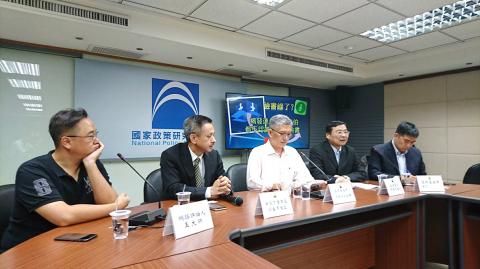The National Policy Foundation, a Chinese Nationalist Party (KMT) think tank, yesterday said that the Democratic Progressive Party (DPP) government might have clamped down on dissidents by allegedly suspending Facebook users who posted comments deemed harmful to the pan-green political camp.
“Facebook has entered a period of ‘Green Terror’ in Taiwan since the DPP took office,” foundation chief executive officer Sun Lih-chyun (孫立群) told a news conference in Taipei.
For example, an article by former Straits Exchange Foundation secretary-general C.V. Chen (陳長文) likening the Executive Yuan’s tightening of regulations on retired government and military officials’ visits to China to the reinstatement of Article 100 of the Criminal Code was temporarily removed by Facebook, Sun said.

Photo: Chen Yu-fu, Taipei Times
The now-defunct law stated that those who conspire to undermine the government, subvert state sovereignty or occupy state-owned land faced a maximum prison term of five years, with the chief conspirator sentenced to life.
Law enforcement bodies abused the article during the White Terror era to arrest dissidents that opposed the government.
There have been other incidents in which Facebook users who criticized President Tsai Ing-wen’s (蔡英文) administration were suspended or had their posts removed, Sun said.
Facebook users in the pan-green camp who had seen content removed by Facebook for criticizing the opposition camp should come forward to prove that Facebook has not been targeting pan-blue users, he said.
Greater Taipei Stability Power Alliance chairman Sun Chi-cheng (孫繼正), who launched a petition to depose New Power Party (NPP) Executive Chairman Huang Kuo-chang (黃國昌) over Huang’s support for homosexual marriage, said he had been suspended by Facebook four times in one day after posting an article about ousting Huang.
Sun Chi-cheng said that in an attempt to find out whether he was targeted, he borrowed his friend’s Facebook account and posted the article again on the same device and was quickly suspended, suggesting that the government might have tracked down and banned his IP address from Facebook.
He said that he finally reclaimed his account after he sent a letter to Facebook’s headquarters asking the company to fire the owner of its Taiwanese partner, a company named cacaFly (聖洋科技).
Internet celebrity Master Wang (王大師) said that he on Monday posted an article on Facebook criticizing the Tsai administration’s policy on currency exchange rates, in which he referred to Taiwanese as Taibazi (台巴子), a derogatory term, and was suspended, while his article was removed.
He has been on Facebook since 2011 when Ma Ying-jeou (馬英九) was president, but had never encountered such a situation when he criticized the KMT during Ma’s term, Wang said.
CacaFly immediately after the news conference said in a statement that it is only responsible for selling advertising rights on Facebook.
Foundation convener Yeh Ching-yuan (葉慶元) asked whether the removal of Facebook articles was part of the Cabinet’s efforts to curb online “fake news,” and whether comments that the DPP administration dislikes were all categorized as fake news.
Sun Lih-chyun urged Executive Yuan Spokesman Hsu Kuo-yung (徐國勇) and the National Communications Commission (NCC) to explain the apparent surge in Facebook censorship.

Alain Robert, known as the "French Spider-Man," praised Alex Honnold as exceptionally well-prepared after the US climber completed a free solo ascent of Taipei 101 yesterday. Robert said Honnold's ascent of the 508m-tall skyscraper in just more than one-and-a-half hours without using safety ropes or equipment was a remarkable achievement. "This is my life," he said in an interview conducted in French, adding that he liked the feeling of being "on the edge of danger." The 63-year-old Frenchman climbed Taipei 101 using ropes in December 2004, taking about four hours to reach the top. On a one-to-10 scale of difficulty, Robert said Taipei 101

Taiwanese and US defense groups are collaborating to introduce deployable, semi-autonomous manufacturing systems for drones and components in a boost to the nation’s supply chain resilience. Taiwan’s G-Tech Optroelectronics Corp subsidiary GTOC and the US’ Aerkomm Inc on Friday announced an agreement with fellow US-based Firestorm Lab to adopt the latter’s xCell, a technology featuring 3D printers fitted in 6.1m container units. The systems enable aerial platforms and parts to be produced in high volumes from dispersed nodes capable of rapid redeployment, to minimize the risk of enemy strikes and to meet field requirements, they said. Firestorm chief technology officer Ian Muceus said

MORE FALL: An investigation into one of Xi’s key cronies, part of a broader ‘anti-corruption’ drive, indicates that he might have a deep distrust in the military, an expert said China’s latest military purge underscores systemic risks in its shift from collective leadership to sole rule under Chinese President Xi Jinping (習近平), and could disrupt its chain of command and military capabilities, a national security official said yesterday. If decisionmaking within the Chinese Communist Party has become “irrational” under one-man rule, the Taiwan Strait and the regional situation must be approached with extreme caution, given unforeseen risks, they added. The anonymous official made the remarks as China’s Central Military Commission Vice Chairman Zhang Youxia (張又俠) and Joint Staff Department Chief of Staff Liu Zhenli (劉振立) were reportedly being investigated for suspected “serious

American climber Alex Honnold is to attempt a free climb of Taipei 101 today at 9am, with traffic closures around the skyscraper. To accommodate the climb attempt and filming, the Taipei Department of Transportation said traffic controls would be enforced around the Taipei 101 area. If weather conditions delay the climb, the restrictions would be pushed back to tomorrow. Traffic controls would be in place today from 7am to 11am around the Taipei 101 area, the department said. Songzhi Road would be fully closed in both directions between Songlian Road and Xinyi Road Sec 5, it said, adding that bidirectional traffic controls would